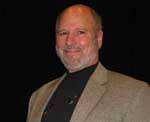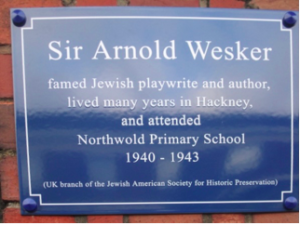By Jerry Klinger

LONDON — The simple blue and white rectangular historical plaque for Sir Arnold Wesker located at a Hackney (London) school evokes a familiar identity in London. The plaque, though different in design, is easily associated with the famous (and mostly circular) Blue and White Plaque program run by English Heritage found throughout London and the U.K., which states that it “celebrates the links between notable figures of the past and the buildings in which they lived and worked.” Over 950 Blue Plaques have been placed in London.
Though Jews have been part of British history since Roman times, only one Blue Plaque has the word Jewish in it. A Blue Plaque is on the former home of Sir Moses Montefiore, “philanthropist, and Jewish leader.” A second Blue Plaque is on the home of Eleanor Marx. It does not have the word Jew or Jewish on it. But it is on a home, #7 Jew’s Walk in London.
Eleanor Marx was the daughter of Karl Marx. Eleanor was an ardent Socialist. She committed suicide by drinking prussic acid. She was said to have become distraught after her idealism was shattered when she learned her father had reputedly impregnated a housemaid in his service.
Other sources contend she was depressed when she learned her partner, Edward Aveling had married another. When Aveling’s health was failing, he returned to Eleanor. She nursed him but then she inexplicably chose to commit suicide. Aveling was accused of causing her death or even murdering her. An inquest ruled she died while suffering from temporary insanity. Aveling died four months after Eleanor. His remains were cremated.
Karl Marx supposedly abandoned the child and the mother. He denied their existence. It would have looked very bad to the father’s Manifesto as the fighter against societal economic exploitation. Karl Marx preferred to live the lie rather than to reveal his ethical and moral bankruptcy, certainly his personal hypocrisy.
Which story about Marx and his daughter was true is mired in the darkness. Enough was true of each to keep scholars open to conjecture.
The Blue Plaques have only a few words to tell big stories. They are remarkable in their paucity of interpretation, reflecting on lives and events that shaped British life and society, like a savory hors d’oeuvre.
The Blue Plaque whets the appetite of the reader to discover the main course on their own.

Arnold Wesker was a Jewish English dramatist. He was born in 1932 in Stepney, London (East End) to socialist/communist, poor working-class refugee parents.
Artistically prolific over his lifetime, he authored 50 plays, four volumes of short stories, two volumes of essays. He was active in journalism, wrote children’s books, poetry, and more. His plays have been translated into 20 languages and have been performed worldwide.
He was an ardent promoter of British arts and humanities. He was an activist who served time in prison protesting nuclear weapons.
In 2006, he was Knighted by the Queen for his lifetime achievements.
His writings humanized the British working poor. Three of his early plays, Chicken Soup with Barley, Roots, and I’m Talking About Jerusalem, interpreted the lives of the Kahn family.
The Kahns were poor Jewish EastEnders. Their story was drawn from his own life and the family he grew up in.
The Kahns were idealistic Communists. Religion had failed them. They believed the socio/economic revolution promised by Communism would bring an end to the suffering and economic exploitation of the masses.
Communism, to the Kahns, would finally end millennia of anti-Semitism.
The plays traced their lives over a 20-year period of radical upheaval in Britain through the Great Depression, the rise of the British Fascist Party, World War II, and the Hungarian Revolution.
As the years unfolded, the family, its idealism, its roots, decayed. The decay paralleled the reality to Wesker as Socialism and Marxism proved to be failed ideologies. Experience proved the ends did not justify the means.
For Wesker, anti-Semitism remained and remains endemic in British life. Jews must not bury their heads, ostrich like hoping evil will pass them by. Jews must confront evil, support others who are oppressed, resist if necessary.
Chicken Soup with Barley opens in the Kahn’s flat. It is 1936. The family is discussing the coming Fascist intimidating anti-Semitic march down Cable Street through the largely Jewish working-class East End. Here’s the dialogue:
“Monty: Sarah, do me a favor, leave the fist till later.
Dave: If, on the other hand, they do try and come up Cable Street, then they’ll meet some dockers and more barricades. And if any get through that lot then they still can’t hold their meetings either in Salmon Lane or Victoria Park Square.
Sarah: Why not?
Prince: Because since seven this morning there’s been some of our comrades standing there with our platforms.
Monty: Blood wonderful, isn’t it? Makes you feel proud, eh Sarah? Every section of this working-class area that we’ve approached has responded. The dockers at Limehouse have come out to the man. The lot!
Prince: The Unions, the Co-Ops, Labour Party members, and the Jewish Peoples’ Council.
Sarah: The Board of Deputies? (The organized British Jewish Federations.)
Harry: There she goes again. Not the Jewish Board of Deputies — they asked the Jewish population to keep away. No, the Jewish Peoples’ Council — the one that organized that mass demo against Hitler some year back.
(Sarah pulls face at him.)”
The Battle of Cable Street, when Jews together with non-Jewish workers from the East End, faced down Sir Oswald Mosely and his 5,000 British Black Shirt Fascist marchers, has a Blue Plaque.
The Wesker plaque is an effort of the U.K. Branch of the Jewish American Society for Historic Preservation, chaired by noted British Historian and Educator Martin Sugarman. The plaque is on an outside wall of the Northwold Primary School Wesker attended.
The text specifically includes the word Jewish. It is a reflection on Jewish commonality and contributions to British life.
It is the only interpretive plaque to Wesker in the U.K.
Five new U.K. marker projects are in development for 2022.
*
Jerry Klinger is the President of the Jewish American Society for Historic Preservation.
Besides the blue plaques commemorating the Marx’s and Sir Moses Montefiore, the ‘official’ London scheme now administered by English Heritage includes a number of other plaques celebrating Jewish individuals who made a significant contribution to human life – perhaps too many list here, but these immediately spring to mind. The London County Council, which ran the scheme from 1900 to 1964, erected a pair of encaustic plaques, terracotta brown in colour with a matt finish which was typical of this era, to the former Prime Minister and statesman Benjamin Disraeli in their first decade – at his birthplace in Holborn, installed in 1904, and the house where he died in Mayfair, placed in 1908. The first of these was damaged in an air raid during the second world war and was replaced with a ceramic replica in 1948. One of the first plaques to be erected by English Heritage commemorates David Ben-Gurion’s former Maida Vale residence. It was placed in 1986 – so close to the changeover that it bears the legend of the outgoing Greater London Council, abolished that same year. Recent recipients of this prestigious honour include the artist and designer Abram Games and the war correspondent and photographer Martha Gellhorn. Charles Coward, named one of the Righteous Among the Nations in 1963, was commemorated with an English Heritage blue plaque at his former Edmonton home, in 2003.
Very interesting. Thanks for this article and also for your work and that of the Jewish American Society for Historic Preservation. Are you in touch with the AJR (Association of Jewish Refugees), which also puts up plaques for Jewish persons of note?